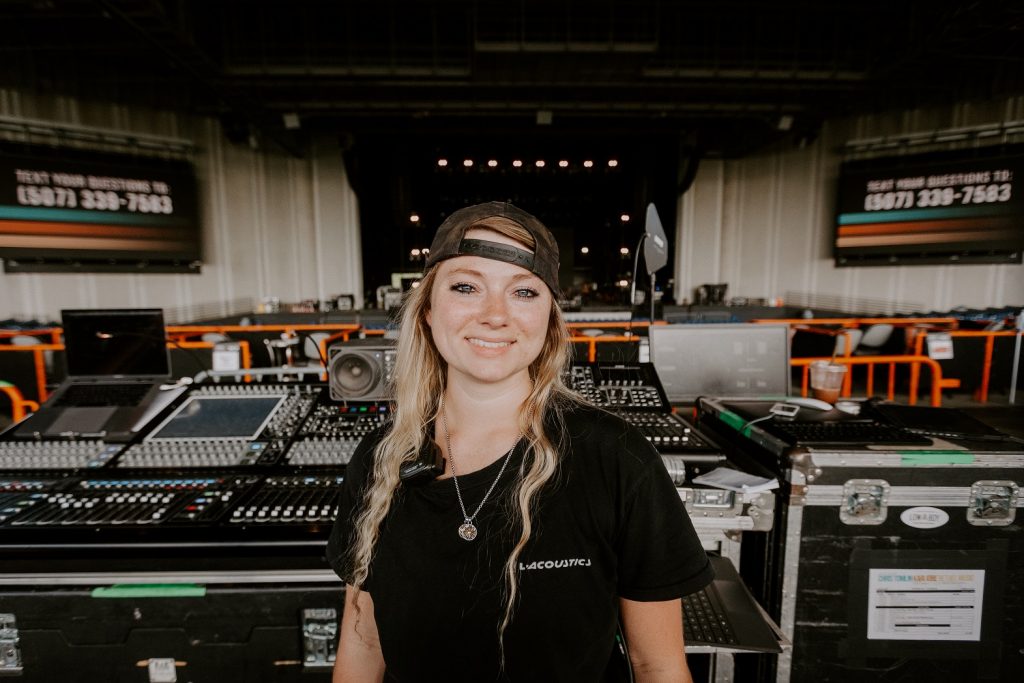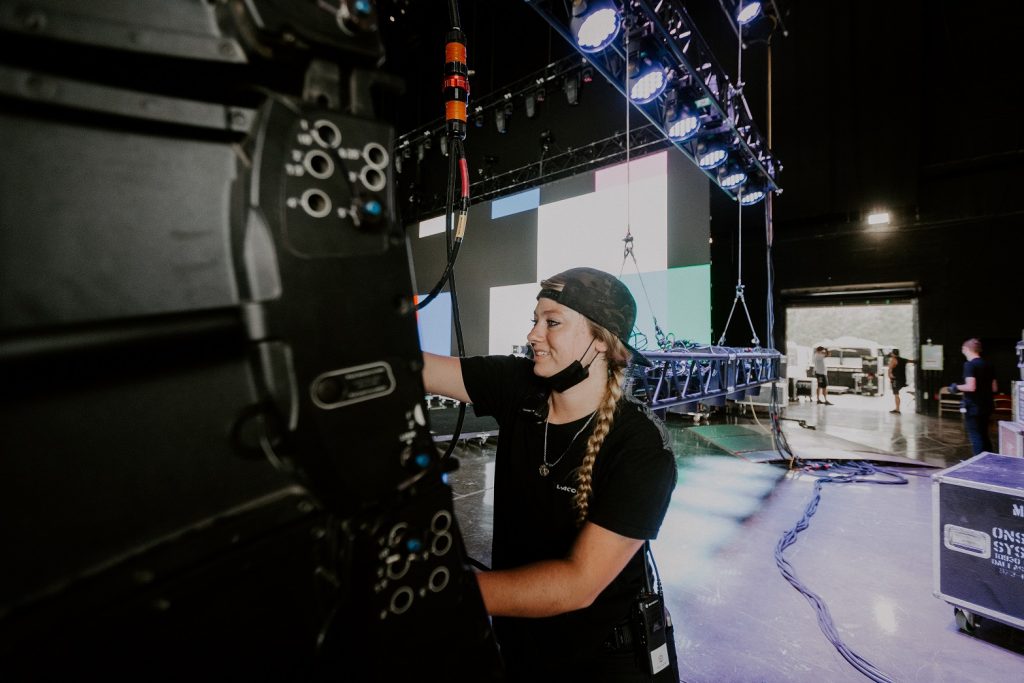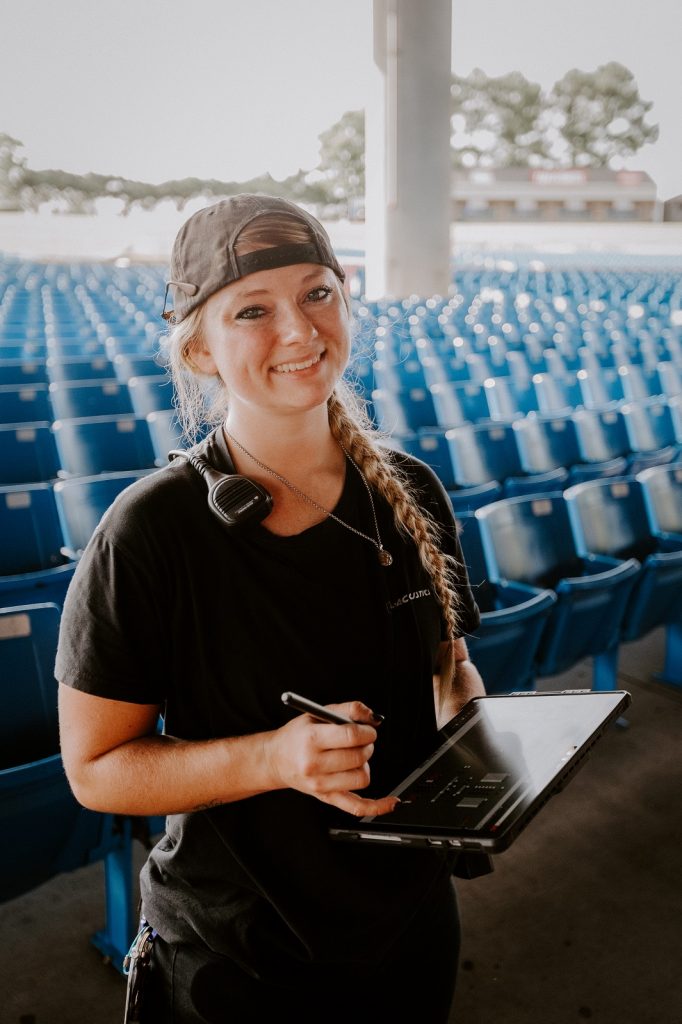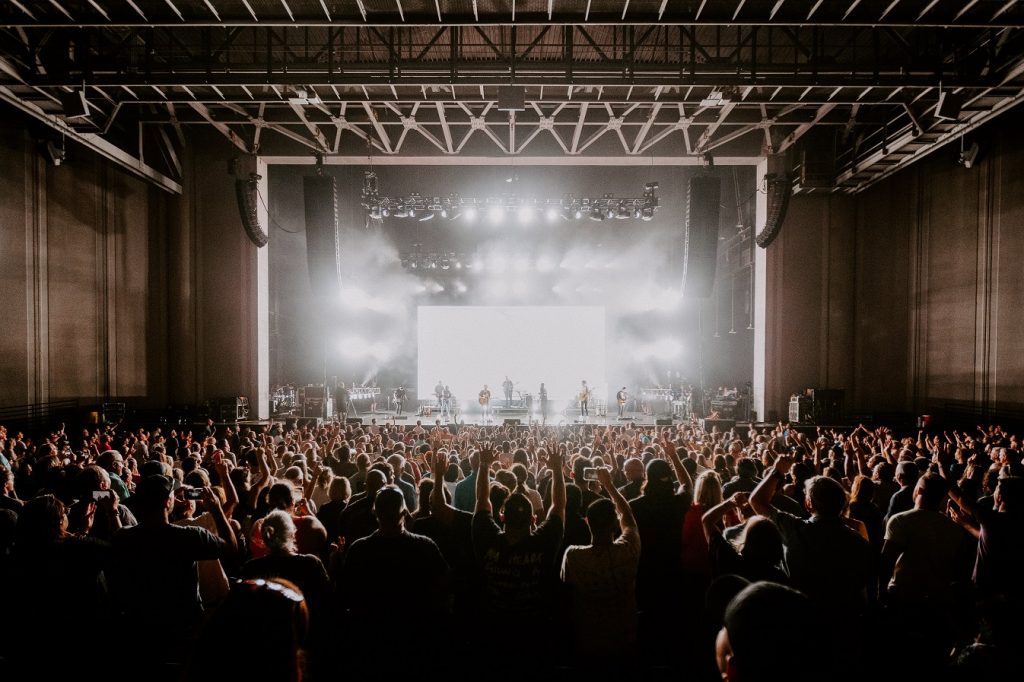Women in Pro Audio: Erika West Women in Pro Audio: Erika West...
“Music heals, and that is something I am proud to be a part of. I am proud to help artists express the feelings behind their songs on a larger scale.” – Erika West
Picture It
You’ve scored tickets to see a band you absolutely love – be it a brand new band or one you wore out the albums listening to in your younger, fast-food-laden angsty years. Tightly clutching your phone where those coveted tickets are stored, the anticipation as you navigate the opening doors to the venue is high. You just know you’re in for an amazing show—and as soon as that first note is played, upcoming work deadlines, bills, or family or friend drama will melt away.
This is the perspective of the usual live concert-goer, a perspective that doesn’t always cover inquisitive thoughts about how the music comes to life through the talented audio pros working diligently behind the scenes—especially the phenomenal women who are making the magic happen.
Enter Erika West
One of those women is Erika West. With almost fifteen years of experience in the pro audio industry—mixing FOH, RF coordinating, PA system design and deployment—Erika West started her career in the music industry mixing church monitors when she was just 11 years old.
“Though, I didn’t realize I could have a ‘real job’ in pro sound until I was presented with the opportunity after high school, in college. I was going to school to be a nurse when I was offered to mix front-of-house, full-time at 18. Up until then, I had been mixing consistently for my church because I was passionate about it. Realizing I could turn my passion into a career was a game-changer for me!”
As she started her professional audio career, Erika discovered that there was a lot more to pro audio than just mixing. At 21, she reached out to an audio buddy she had previously worked with at a local production company. He connected her with Onstage Systems, an L-Acoustics Certified Partner, in Dallas, Texas, and started learning from “experienced rock n’ roll guys.”
“I took a position on their staff, where I fell in love with flying PAs. However, it wasn’t easy at first because my experience leading up to that point had primarily been mixing and some install work. My lack of experience outside of my honed skill set showed, but I had to quickly adjust my focus from just mixing to now flying PAs, RF coordinating, festival patching, etc. The guys were a little skeptical of me and my abilities because of my inexperience, so I hit some rough spots. But letting myself fall onto my own two feet was what built our mutual respect. The guys made a point not to treat me differently from any other tech when it came to putting me through the fire, which I greatly appreciated, and they came to respect me.”
Challenges as a Woman
The only time Erika has personally seen a difference with being a woman in this industry is when someone decides to point it out. “The ‘what’s it like being a female audio engineer’ question always makes me laugh because I get asked this regularly! It’s like people suspect it must be hard, but the work is pretty much the same as being a male—EXCEPT I get asked this question too often. When I walk onto a show site, I don’t notice that I’m different—it isn’t until someone points out that I am the only female on the crew that I see the line in the sand. Thankfully in 2021, we have it much easier than the women who have paved the way over the past 60+ years.”
However, Erika points out the challenges lie in basic communication with other male engineers. “For some reason, it’s hard for people to imagine males and females getting along in a platonic, professional way. I have to be mindful of how I contact people—time of day, what I say, how I word things. For example, ‘Can I get your number?’ for professional reasons. It’s like disassembling a bomb—even learning how to say ‘no’ without it being perceived as unprofessional.
“Sometimes I just have to be cognizant when communicating with people who have had a ‘bad taste in their mouth’ about women (in our industry or their personal lives). I have to pilot communications through their perspective and use a filter before I even speak. I’ve also learned to pick my battles. I have turned down shows because it isn’t worth the fight to teach people that women can do this job.
“One example is when I was once turned down on a tour because the team didn’t think a woman could handle being on the bus with a bunch of men. I politely reminded them of my resume and that I’ve already traveled with larger acts, on a tour bus, with no issues, and their excuses were not only invalid but just plain ignorant.”
Audio Challenges
Every time Erika hits a roadblock, she clears her head and regroups. “I start by figuring out what I do know, which makes the unknown questions more visible. Then, I troubleshoot and go up the chain – if it’s something I cannot address on my own, I ASK FOR HELP. Sometimes that’s in the form of a YouTube video or phoning a friend. Pride will kill you in this job. You must have that determination and humility to get the job done at the end of the day. Don’t be in your own way when everything is already working against you. And be open to listening to feedback.”
Memorable Show Moments
“I can think of a few: the 2019 Super Bowl Live! in Atlanta, Georgia, and SXSW in Austin, Texas in 2019. Although, there’s something special about my first George Strait show.
“You see, my parents’ idea of success looked like me being a doctor, lawyer, or nurse. So when I left college to be a full-time sound engineer, they didn’t feel like I was working a real job. But when I worked my first show with George Strait, my parents finally recognized my career—three years into my decision—as a legitimate career. Not only that, but getting to the level of doing stadium shows was a special moment for me to stop and recognize how far I had truly come—hearing the roar of a stadium filled with people singing louder than my PA. Wow, what a rush! At that moment, after facing many years of challenges, I could finally see that it was all worth it.”
While working on a festival, Erika and the crew had to evacuate due to 75mph winds! “When we came back, we found all of our FOH audio consoles had been taken out by the storm. The stage and monitor desks were fine, but it didn’t look like we would be able to have a show. We worked vigorously, got a new FOH console, and made the show happen after a new sound check! It was quite a rush but so-so-very satisfying.”
Advice from Erika
Erika presses upon connecting with a mentor locally or from afar for anyone just getting started in audio. “Someone you can learn from and who is willing to share real-world knowledge. As for women and girls, specifically, don’t ever see yourself through someone else’s lens. You’re going to be seen as ‘different’ by others, but what matters the most is how you carry yourself.
“Remember that you are a small yet significant part of a much larger machine. If you walk onto any show site and think ‘I’m the best,’ or ‘I’m the least,’ you won’t be focused on the job. Lean into your skill. Try to remember your purpose and why you started when you begin to feel burned out. Always show up with confidence, but do not let pride fuel your confidence. We are all a part of something much bigger than ourselves, which is something to be proud of.
“Communication too. It will make or break a show and determine if you get a callback. You have a responsibility to carry your team and yourself through whatever challenge you are in. The day can go nine different ways from sideways, but if you can communicate to the stagehands, client, and everyone in between with respect and integrity, that will create a lasting impression. It also determines your effectiveness as a leader. You don’t have to be the crew lead to communicate as a leader. Your communication may just land you the position before you are even given a title.
“Also, the SMAART program allows you to get quantitative data to prove or disprove what you may or may not be hearing in a given situation. And last but not least, read the manual!”
Creating the Ultimate Escape
Even if it is only for three hours of someone’s day, Erika loves that she’s making a difference in someone’s life in the audience. “Maybe that someone is excited to be celebrating a major life event. Or maybe they are facing a tough situation at home, work, or in their personal relationships. Whatever the case may be, for those three hours they’re at my show, I hope that hearing that one song they came to hear puts a smile on their face, and it becomes that ultimate escape from their worries. For those three hours, no one cares who you voted for, your favorite football team, or what car you drive—everyone in the crowd becomes united when they start clapping and singing the same lyrics. It transcends worldly problems for a moment in time.”
Art and Culture are Essential
After the tragedy of 2020, the live sound industry has been slowly picking up the pieces and putting itself back together again. Like awakening from a surrealist artist’s lurid dream, emerging from the devastation of the pandemic has been a little disorienting and sluggish. Yet live events are beginning to shape into their former selves.
Erika feels relief in all of it because “Live events are a necessary part of the human experience.” As an engineer with first-hand experience trying to make virtual events as personable and memorable as possible, it never felt the same as the in-person euphoria for Erika. “Despite the obvious technical challenges we experienced early on, it became evident that the artist and the concert-goer have a connection that you just cannot virtually replicate. The connection transcends from the stage to the audience.”
She also explains how powerful live events can be for people. “I can’t heal someone’s hurt, but I am a firm believer that music can. Whether it’s their favorite song they listen to on their way to work or the song they cried to that got them through the worst year of their life. Music heals, and that is something I am proud to be a part of. I am proud to help artists express the feelings behind their songs on a larger scale.
“I’ve always wanted to take care of people, so I decided early on to be a nurse, and despite the career change, I feel like I am still fulfilling my calling—just in a different way. I recognize the value and difference it makes, and I hope others get to experience that as we get back to live events.”
The Future of Pro Sound
“I am very intrigued with the whole immersive sound idea. It’s exciting to see that we are finding new ways to experience live events. I think it is becoming a huge tool in our field, I’m excited to see how it grows and the new ways we can implement it with amazing tools such as L-ISA! The world of possibilities it holds proves the start of a new era.”
To learn more about Erika (or hire her because she’s an amazing rare talent), check out her website erikawestaudio.com.



